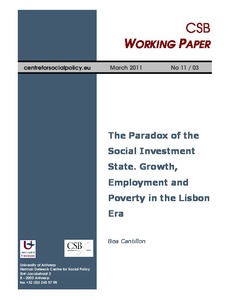The paradox of the social investment state. Growth, employment and poverty in the Lisbon era
"After the European Year for Combating Poverty and Social Exclusion, on the eve of the elaboration of policies designed to help reach the Europe 2020 target of lifting 20 million people out of poverty, it is important to take stock of the outcomes of the Lisbon agenda for growth, employment and...
| Main Authors: | , |
|---|---|
| Institution: | ETUI-European Trade Union Institute |
| Format: | TEXT |
| Language: | English |
| Published: |
Antwerp
2011
CSB |
| Subjects: | |
| Online Access: | https://www.labourline.org/KENTIKA-19178999124919961719-The-paradox-of-the-social-inve.htm |
| Summary: | "After the European Year for Combating Poverty and Social Exclusion, on the eve of the elaboration of policies designed to help reach the Europe 2020 target of lifting 20 million people out of poverty, it is important to take stock of the outcomes of the Lisbon agenda for growth, employment and social inclusion. The question arises why, despite growth of average incomes and of employment, poverty rates have not gone down, but have either stagnated or even increased. In this paper we identify the following trends: rising employment has benefited workless households only partially; income protection for the working-age population out of work has become less adequate; social policies and, more generally, social redistribution have become less pro-poor. These observations are indicative of the ambivalence of the Lisbon Strategy and its underlying investment paradigm." |
|---|---|
| Physical Description: | 29 p. Digital |

